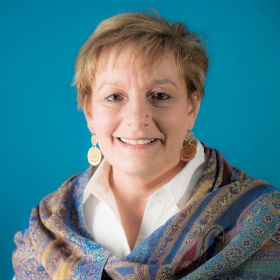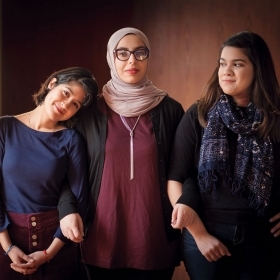Karen Zuffante Pabon
Karen Zuffante Pabon’s efforts have been trained on helping Wellesley’s international community stay informed, feel connected, and know they have an advocate on call.

Photo by Richard Howard
News of the Jan. 27 executive order—that first presidential attempt to deliver on a campaign promise to ban Muslims from entering the country—landed with a wallop at Wellesley, particularly on the desk of Karen Zuffante Pabon. As the director of Slater International Center and the individual responsible for federal immigration compliance for students, faculty, and staff, Pabon says her work took a sharp turn that day. For the 300 international students she advises, especially those from the predominantly Muslim countries targeted by the first executive order, the turn of events felt even sharper.
One student said the travel ban called into question her “whole life’s journey,’” Pabon says. “She was quite mature about it, but she said she would have to rethink her plan to go to law school, her whole career. She said, ‘If I can’t travel freely, I’ll have to change my strategy and transfer to a school in Europe. I can’t spend my life being trapped here in the U.S.’”
In the weeks after the first order and every subsequent wave of developments—ban issued, ban blocked by courts, and repeat—Pabon’s efforts have been trained on helping Wellesley’s international community stay informed, feel connected, and know they have an advocate on call. Which is no small task, given the expanse of the shadow cast by these decrees. “Different segments of our population are impacted by this in so many ways,” Pabon says. Beyond those from the original list of countries—Iran, Syria, Sudan, Somalia, Libya, Yemen, and Iraq—consider the weight of worry on anyone who is undocumented or has undocumented family members. “We’ve had a huge range of inquiries and fear,” Pabon says, from American students abroad to an accepted student from one of the seven countries whose chances for securing a visa seem to rise and fall with each news cycle.
Pabon’s first move, as soon as the details of the travel ban were released on Jan. 27, was to determine how many students (current, recently graduated, and prospective) were associated with the seven countries. She reached out immediately to reassure them that the College was monitoring developments and to offer the full range of support services available on campus.
‘I see our international students as a gem of a resource here, in the classroom and out, in so many informal ways that students learn from different perspectives and values. To think all of that is threatened.’
The next evening, students gathered in Slater Center, a home away from home for the international community. Pabon’s office is just inside the front door, where a world map displays a pin for every international student in recent years, creating a picture of global education in straight-pin pointillism. But on the evening of Jan. 28, gathered in Slater’s living room, students felt far from home, Pabon says. “There were tears. They wondered if they were welcome here, they asked if it was safe to go out in hijab,” she says. “They wondered if they would be persecuted.”
Pabon credits the College community for putting any such questions to rest, at least within the bubble. President Johnson released a statement on Jan. 29, reaffirming Wellesley’s “unwavering support” for those affected. Alumnae chimed in with offers of housing and pro bono immigration work, and let’s not forget the cookie bouquets. Meanwhile, students organized rallies on the quad and panel discussions about immigration and the executive orders. At President Johnson’s request, an immigration working group took shape; participants include students, faculty, staff, a union member, Chief of Police Lisa Barbin, and Pabon, of course.
Still, the news is shifting, and Pabon can’t help but feel saddened. “I see our international students as a gem of a resource here, in the classroom and out, in so many informal ways that students learn from different perspectives and values. To think all of that is threatened. … ,” Pabon says, trailing off. “My response is to say OK, our work is much more important than ever. We just have to work harder.”


